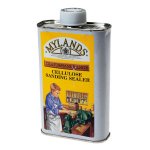His treatment works very well, it dries faster than water will even with a hair dryer. It also penetrates the fibres and seems to harden them so after the finish sanding is completed, and you run a buff on the shaft, it gets shiner and smoother than if it wasn't used. It's not a sealer, but it seems to have some sealer type properties IMO. For a sealer, at this time, I use the one that Cue components sells. I bought a pint and they sent a quart instead, so I have quite a bit of it. It works well, dries very fast, but I use it on a spinning lathe, haven't tried it without spinning it.Flex said:I just checked out his website and only found a product to raise the wood fibers before using a sealer. BTW, a damp cloth wiped over wood will raise the fibers, and using a hair dryer will speed up the process. Using a damp cloth is free, his grain raising product will set you back some cash.
Did you find a sealer product somewhere on his website?
Flex
Dave
